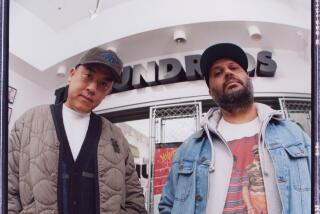COMMITMENTS : Snapping Back : When playing ‘the dozens,’ nothing’s off limits--not even your mother. All you need is a quick wit, a sharp tongue and a cool head.
- Share via
It could be in the locker room, the park, the schoolyard, or on the front steps on a summer night. A small group of friends are gathered, and somebody starts it:
“Your mother is so generous, she would give you the hair off her back.”
“Yeah? Your mother is so old, she was the waitress at the Last Supper.”
“Your mother is so fat, she stepped on a dollar and got change.”
Playing the dozens, as this little game is called, could end with everyone laughing, or the loser stomping away in anger, vowing to have better comebacks next time.
Among African Americans, the dozens--also known as snapping, capping, ranking or busting--is a verbal tradition that dates back to slavery. It’s a game of quick wit and sharp tongue, and must always be performed in front of an audience. While just about anything can be a topic, “your mother” is a standard, probably because mothers are so dear to most people.
For years, playing the dozens was confined to the community from which it came, but no more. Thanks to such television shows as “In Living Color” and “Def Comedy Jam,” the dozens has gone mainstream, and its main purpose is entertainment.
Now comes a book called “Snaps” (William Morrow, 1994), containing 450 “snaps” collected from a range of sources, from celebrities such as Montel Williams and Robert Townsend to those heard on the street. The book cover bears one from Quincy Jones: “If ugliness were bricks, your mother would be a housing project.”
It’s believed that the term the dozens comes from the practice of grouping together slaves who were infirm and selling them as a group at a bargain rate. Being sold in this way was the ultimate insult. As time went on, the game was used as a way to learn to control anger that could not be expressed.
In the foreword, producer Jones writes that “Playing the dozens is a sociological condition transformed into an art form. . . . It’s a style of humor that enables us to deal with the pain in our lives. It’s a serious art tradition. It’s part of our folklore.”
Today, “the dozens is still about maintaining your cool,” Jones writes. “It’s a skill that requires verbal creativity, memory, humor and chops to deliver your lines. Playing the dozens requires a sophisticated mind. It’s not like expressing yourself with a gun, which requires no wit, no strength, no power.”
“Your family is so poor they go to Kentucky Fried Chicken to lick other people’s fingers.”
“Your shoes are so old, when you step on gum, you know the flavor.”
The authors of the book are “2 Bros. & a White Guy,” James Percelay, Stephan Dweck and Monteria Ivey. Percelay learned about the dozens firsthand when he found himself the only white person in the audience at a comedy club in New York. Ivey, the comedian onstage, mercilessly snapped on Percelay, a television executive out scouting for new talent.
“I had never experienced this well-practiced ritual game of insults,” Percelay recalls. Sitting next to him was Stephan Dweck, an entertainment lawyer and friend of Ivey’s. “He said, ‘Be cool, we do this all the time.’ ”
After the show, the three got together and talked. They became friends and decided to write the book. They formed a production company, 2 Bros. & a White Guy Inc., based in New York. “We want to identify and bring these cultural traditions no one knows about to a broad audience,” Percelay says. A new book, called “Double Snaps,” will be out by Christmas. An HBO television special based on the first book will start taping in June.
“Snaps” was published in February, sold 70,000 copies in eight weeks and is now in its fifth printing. “We were prepared for a strong negative reaction from people who would take the jokes as being literally against someone’s mother,” Percelay said. “We were surprised that we got calls thanking us for keeping the book raw and honest.”
Jerry Watts, associate professor of American studies at Hartford’s Trinity College, says the game has strict rules that must be adhered to. “It’s a ritual. Everybody has to understand the rules, including the people watching. Even the person who is the brunt of it will laugh,” he explains.
To be done right, the snap is often crude, but not objectively true. Timing, delivery and creativity are also important. And it’s best to know who you’re dealing with before you start snapping, he adds: “You have to know what the boundaries are. You can’t snap on a gangster; he might step out of the role.”
Jim Miller, an English professor and director of American studies at Trinity, questioned whether the essence of such folk tradition can ever really be captured in book form. “What happens in oral tradition is that by the time it’s discovered by the mainstream, it’s moved on to something else.”
Miller says he recalls the dozens from his childhood in Providence. “I can still can get some pretty good ones off. Having been raised in that tradition prepared me for academic life.”
More to Read
Sign up for our Book Club newsletter
Get the latest news, events and more from the Los Angeles Times Book Club, and help us get L.A. reading and talking.
You may occasionally receive promotional content from the Los Angeles Times.









